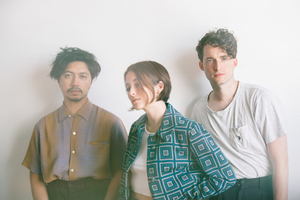Nation Of Language Release 'Across That Fine Line'
Share “Across That Fine Line” lyric video via YouTube, and pre-order your vinyl copy of A Way Forward.
By: Sarah Jae Leiber Jun. 03, 2021

Having released one of the most acclaimed debut albums of 2020, New York City trio Nation of Language today announce their sophomore follow up, A Way Forward, and share the album's first single, "Across That Fine Line." Additionally, the electro-synth explorers will head out on their first U.S. headlining tour this September-October in support, along with previously announced appearances at Reading-Leeds Festival in the UK and Governors Ball in New York [all dates below - with more TBA]. Share "Across That Fine Line" lyric video via YouTube. Pre-order your vinyl copy of A Way Forward.
Discussing "Across That Fine Line" songwriter/vocalist Ian Devaney stated, "'Across That Fine Line' is a reflection on that moment when a non-romantic relationship flips into something different. When the air in the room suddenly feels like it changes in an undefinable way. It's a kind of celebration of that certain joyous panic, and the uncertainty that surfaces right after it. Sonically, it's meant to feel like running down a hill, just out of control. I had been listening to a lot of Thee Oh Sees at the time of writing it and admiring the way they supercharge krautrock rhythms and imbue them with a kind of mania, which felt like an appropriate vibe to work with and make our own."A Way Forward is the follow up to Nation of Language's debut album, Introduction, Presence, released in 2020 during the early stages of COVID's merciless mayhem, naively pushed from early April to late May, with the hope that things would improve by the summer. While that turned out to not be the case, a flurry of raves for the album from journalists and radio stations around the world, as well as landing on year-end 'Best of' lists from Rough Trade, Stereogum, Paste, Under The Radar, the NME, and glowing reviews from Pitchfork and the Associated Press, caused the album to reach more people than the band ever thought possible, even as they were unable to tour in support of it. "We've always been real believers in our live show as the best way to reach new people," Devaney said. "When it became clear there wouldn't be any touring, we were sure it was a death knell for the album."
With the pandemic putting so much on hold, Nation of Language (Devaney, with keyboardist Aidan Noell and bassist Michael Sue-Poi), decided to forge ahead and begin work on what would become A Way Forward. While much of the sounds on Introduction, Presence garnered comparisons to the synth-punk sound of the 80's, with this new set of songs the band delved heavily into the Krautrock pioneers and electronic experimentalists of the 70's for inspiration in the studio, stretching their boundaries in new and different ways. Production on the record was divided between Abe Seiferth (who worked on Introduction, Presence) and Nick Milhiser of Holy Ghost!
Discussing, Devaney added, "'A Way Forward' is an exploration of the band's relationship to the music of the 70s, through the lenses of krautrock and early electronic music. We aimed to more deeply trace the roots of our sound, hoping to learn something from the early influences of our early influences. Experimenting with how they might be reinterpreted in our modern context - looking further backward to find a way forward.
We drew a lot from the steady locomotive rhythms of bands like Kraftwerk and Neu!, while also looking to less-propulsive electronic artists like Laurie Spiegel and Cluster. The goal was to have a record that felt like a journey, like being on a train that gets lost in a colorful fog, and then suddenly bursts through into different landscapes.
Thematically, some of those landscapes are familiar in their melancholy, but we also wanted to introduce celebration and joy in a way that hadn't really been present in our previous album. Having these bursts of positivity felt like it gave the emotional low points more resonance, giving a stronger sense of emotional reality to the album overall."
Listen here:
Comments
Videos

